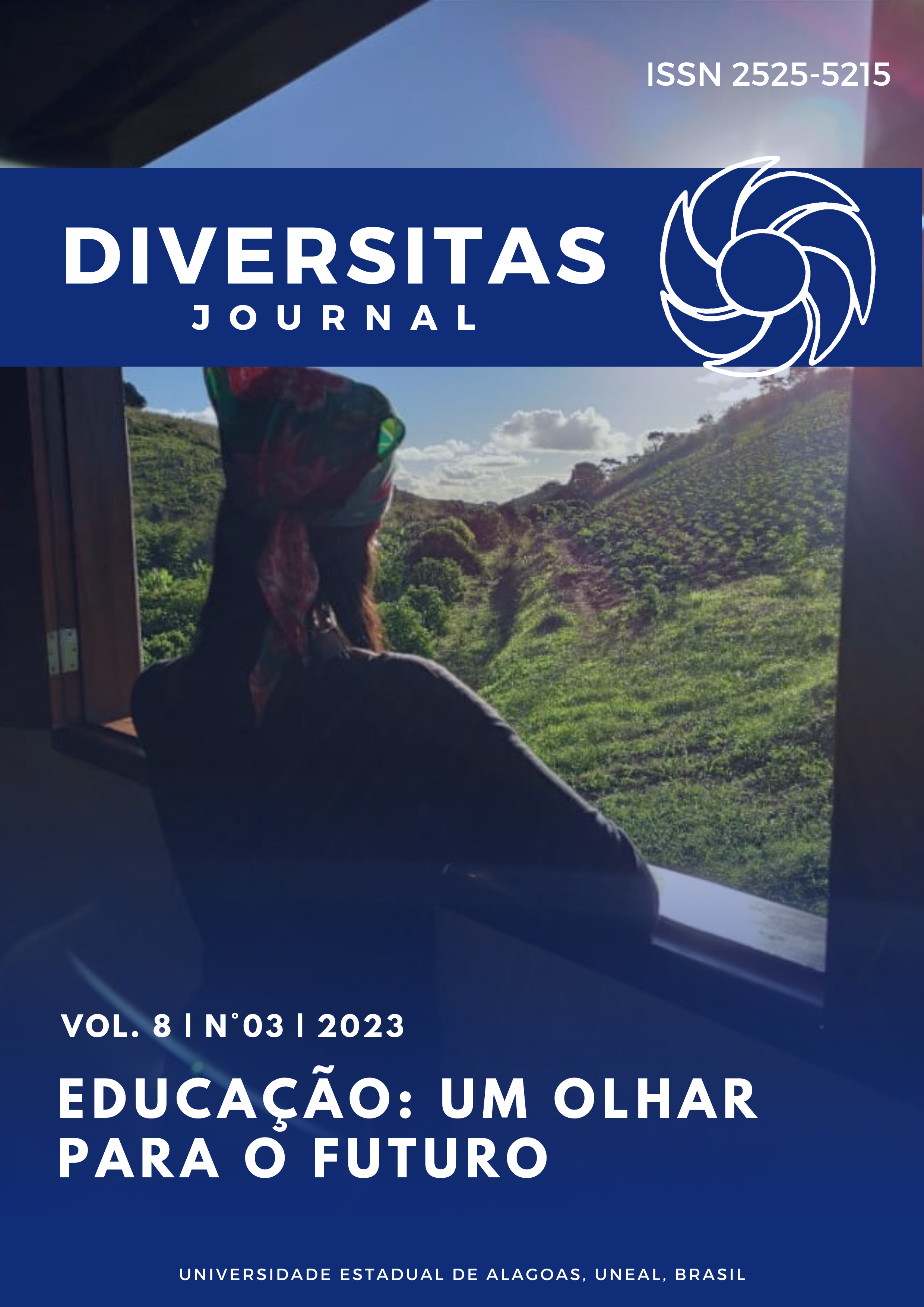Digital booklet
the direction of electronic waste through educational actions in basic education
DOI:
https://doi.org/10.48017/dj.v8i3.2447Keywords:
Environmental education, Electronics, ConsumerismAbstract
The correct direction of electronic waste goes far beyond measures aimed at environmental conservation, it is about management models that aim to guarantee collective actions generating socio-environmental awareness when correctly applied through of walls’ school. In this way, the present work aims to promote environmental education through the use of digital booklets, so that it collaborates to share the theme in the teaching and learning process in basic education. The content of the booklet was designed to be used in an interdisciplinary way by teachers in different areas of knowledge. The research was carried out in a state school in Aldeia, located in the municipality of Camaragibe -PE. An effective qualitative research was carried out, thus obtaining data that together with a bibliographic research contributed to the elaboration of the educational product. After submitting the educational product developed to the analysis of educators, it was found that it can help students understand the importance of correctly disposing of electronic waste and the permanent construction of awareness, sensitization guiding the practice of these socio-environmental actions through Education.
Metrics
References
Brasil. Resolução n° 2 de 15 de junho de 2012. Estabelece Diretrizes Curriculares Nacionais para a Educação Ambiental, 2012. http://portal.mec.gov.br/index
Cyriaco, A. F. F., Nunn, D., Amorim, R. F. B., Falcão, D. P., Moreno, H. (2017). Pesquisa qualitativa: conceitos importantes e breve revisão de sua aplicação à geriatria/gerontologia. Geriatrics, Gerontology and Aging, v. 11, n. 1, p. 4-9.https://cdn.publisher.gn1.link/ggaging.com/pdf/v11n1a02.pdf
Diário do Comércio, Brasil é o país que mais produz lixo eletrônico na América Latina. 2020. https://diariodocomercio.com.br/livre/brasil-eo-pais-que-mais-produz-lixo-eletronico-na-america-latina,2020.
Dwivedy, M., Mittal, R.K. (2012). An investigation into e-waste flows in India. Journal of Cleaner Pro-duction, v.37, p. 229-242. https://doi.org/10.1016/j.jclepro.2012.07.017
Hoffmann, J. (1992). Recovering precious metals from electronic scrap. Journal of the Minerals, Met-als and Materials Society. DOI:10.1007/BF03222275
Lima, I.S.(2020). Lixão de Céu Azul, em Camaragibe, será fechado em outubro: O lixão é o último em atividade na Região Metropolitana do Recife. In: Lixão de Céu Azul, em Camaragibe, será fechado em outubro: O lixão é o último em atividade na Região Metropolitana do Recife. [S. l.].https://radiojornal.ne10.uol.com.br/noticia/2020/09/28/lixao-de-ceu-azul-em-camaragibe-sera-fechado-em-outubro-195945/index.html. Acesso em: 25 nov. 2020.
LIXO ELETRÔNICO-Parte 2. Vídeo. 7min35s. Publicado pelo canal Krefta Tecnologia em serviços-PR, 21 mar. 2016. https://www.youtube.com/watch?v=LerzgNYWIvU. Acesso em 14 set. 2019.
Masetto, M. T. Mediação Pedagógica e o Uso da Tecnologia. In.: MORAN, J. M. MASETTO, 2013. https://www.academia.edu/10222269/Moran_Masetto_e_Behrens_NOVAS_TECNOLOGIAS_E_MEDIA%C3%87AO_PEDAGOGICA
Méllo, R. P., Silva, A. A., Lima, M. L. C. L, Di Paolo, A. F. (2007). Construcionismo, práticas discursivas e possibilidades de pesquisa. Psicologia e Sociedade, v.19, n.3, p. 26-32. https://doi.org/10.1590/S0102-71822007000300005
Moreira, A. F. B. (2001). O campo do currículo no Brasil: os anos noventa.Currículo sem fronteiras, v. 1, n. 1, p. 35-49. https://doi.org/10.1590/S0100-15742002000300005
Moreira, D. (2007). Lixo eletrônico tem substâncias perigosas para a saúde humana. https://computerworld.com.br/acervo/idgnoticia-2007-04-26-7348055458.
Morin, E. (2011). Introdução ao Pensamento Complexo. trad. Eliane Lisboa. 4 ed. Sulina. https://www.editorasulina.com.br/img/sumarios/313.pdf
Neponuceno, A. F., S. F.; Garcia, P. H.(2019).Proposta de uma Cartilha Educativa a Respeito da Evolução Urbana de Três Lagoas para o Auxilio nas Aulas de Geografia. Mato Grosso do Sul. https://ppggeografiacptl.ufms.br/files/2019/12/29-32.pdf.
Nicola, J. A., Paniz, C. M. (2017). A importância da utilização de diferentes recursos didáticos no Ensino de Ciências e Biologia. In For, v. 2, n. 1, p. 355-381. https://ojs.ead.unesp.br/index.php/nead/article/view/infor2120167
Pasquali, L. (1997). Psicometria: teoria e aplicações. Brasília: Editora UnB. p. 161-200. http://www.de.ufpb.br/~ronei/ermac023.pdf
Perióticos, Qualis. (2018). Coordenação de Aperfeiçoamento de Pessoal de Nível Superior (CAPES). https://www.gov.br/capes/pt-br/centrais-de-conteudo/documentos/conselho-tecnico-cientifico-da-educacao-superior/anexos-ctc-es/anexo-01-186.pdf
Rizzatti, I. M., Mendonça, A. P., Mattos, F., Rôças, G., Silva, M. A. B. V. da., Cavalcanti, R. J. de S., Oliveira, R. R. de. (2020). Os produtos e processos educacionais dos programas de pós-graduação profissionais: proposições de um grupo de colaboradores. Actio: Docência em Ciências, v.5, n. 2, p. 1-17. https://periodicos.utfpr.edu.br/actio/article/view/12657
Step Initiative. (2014). “One Global Definition of E-Waste”. United Nations University 3576. https://collections.unu.edu/eserv/UNU:6120/step_one_global_definition_amended.pdf.
Sousa, L. O., Bernardino, A. A contação de história como estratégia pedagógica na Educação Infantil e Ensino Fundamental. Revista de Educação, v. 6, n. 12, p. 235-249, 2011. https://doi.org/10.17648/educare.v6i12.4643
Vianna, H. M. (1982). Testes em educação. IBRASA. Ziesmann, C. I., Baumgratz, C. E. & Batista, T. P., E. S. Pauletti. Rodas de conversas e oficinas pedagógicas: uma possível estratégia para sensibilizar e refletir sobre a educação ambiental. Revista de Educação, Ciências e Matemática, v. 12, n.1, 2022. http://publicacoes.unigranrio.edu.br/index.php/recm/article/view/6076
Downloads
Published
How to Cite
Issue
Section
License
Copyright (c) 2023 Janaina Luiza Simões dos Santos, Rafaela Alves Pereira da Silva, Bruno Severo Gomes

This work is licensed under a Creative Commons Attribution 4.0 International License.
The Diversitas Journal expresses that the articles are the sole responsibility of the Authors, who are familiar with Brazilian and international legislation.
Articles are peer-reviewed and care should be taken to warn of the possible incidence of plagiarism. However, plagiarism is an indisputable action by the authors.
The violation of copyright is a crime, provided for in article 184 of the Brazilian Penal Code: “Art. 184 Violating copyright and related rights: Penalty - detention, from 3 (three) months to 1 (one) year, or fine. § 1 If the violation consists of total or partial reproduction, for the purpose of direct or indirect profit, by any means or process, of intellectual work, interpretation, performance or phonogram, without the express authorization of the author, the performer, the producer , as the case may be, or whoever represents them: Penalty - imprisonment, from 2 (two) to 4 (four) years, and a fine. ”


















